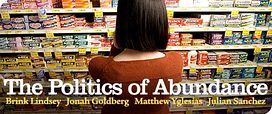In his most recent post, Jonah makes the point that our expanded cultural freedom has had very different consequences for people at the top and bottom of the socioeconomic scale. I agree, and I said so in my book.
It’s not just that the rich have the money to buy their way out of jams. More important, people from middle-class and upper-middle-class backgrounds live in a cultural milieu that fosters long-term planning and the self-discipline on which such planning depends. No longer the repressed squares of bourgeois yore, they yield to the temptations of the flesh — but moderately. They are enlightened hedonists.
The enlightenment that makes the hedonism possible is a fundamental commitment to socioeconomic success, including the assumption of personal responsibility for achieving that success. This commitment takes the form of the core middle-class values of strong families, education, and hard work.
I agree with Jonah that the survival and spread of these core middle-class values is vital to the continued health of American society. Indeed, in a recent piece for the Wall Street Journal, I argued that cultural renewal in the bottom half of the socioeconomic scale is the key to reversing economic inequality.
And I agree further that conservatives are the natural champions of the values of upward mobility. But instead of identifying these values with America’s broad cultural center of enlightened hedonism, conservatives have fallen into pandering to the crudest forms of populism — gay-bashing, nativism, and jingoism. Consequently, conservatism is now more associated with cultural and regional outliers (i.e., evangelicalism and the South, respectively) than the broad American mainstream. As I wrote recently in National Review (here and here), conservatives need to give up the divisive mentality of the culture wars and rediscover the cultural center.

